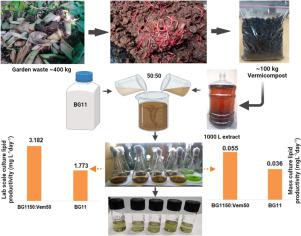Science of the Total Environment ( IF 8.2 ) Pub Date : 2021-10-16 , DOI: 10.1016/j.scitotenv.2021.150995 V Santhana Kumar 1 , Soma Das Sarkar 2 , Basanta Kumar Das 3 , Dhruba Jyoti Sarkar 1 , Pranab Gogoi 4 , Praveen Maurye 1 , Tandrima Mitra 5 , Anjon Kumar Talukder 1 , Satabdi Ganguly 3 , Subir Kumar Nag 2 , Sukham Munilkumar 6 , Srikanta Samanta 7

|
Biodiesel production from microalgae has gained significant interest recently due to the growing energy demand and non-renewable nature of petroleum. However, high cost of production and environmental health related issues like excess use of inorganic fertilizers, eutrophication are the major constraints in commercial-scale biodiesel production. Besides this, solid wastes (garden-based) management is also a global concern. In the present study, to overcome these limitations vermicompost extract was tested as nutrient source to enhance growth performance and lipid production from a freshwater microalga (Graesiella emersonii MN877773). Garden wastes were first converted into vermicompost manure and its extract (aerobic and anaerobically digested) was prepared. The efficacy of the extract was then tested in combination with BG11 medium. The mixotrophic cultivation of microalgae in anaerobically digested vermicompost extract at 50:50 combination with BG11 medium enhanced the cell biomass (0.64 g d. wt. L−1) and lipid productivity (3.18 mg L−1 day−1) of microalgae by two times. Moreover, the combination also improved the saturated (methyl palmitate) and monounsaturated fatty acids (oleic acid) content in the test algae. The quality of biodiesel also complies with all the properties of biodiesel standard provided by India, the USA, and Europe except the cold filter plugging property. The combination was also found to improve the cell biomass (0.041 g L−1) as compared to BG11 medium in mass-scale cultivation. Hence, the study proved that G. emersonii grown in media supplemented with garden waste-based vermicompost extract had significant potential for mass-scale biodiesel and bioproduct production.
中文翻译:

通过对基于花园废物的蚯蚓堆肥的增值,从微藻 Graesiella emersonii 可持续生产生物柴油
由于不断增长的能源需求和石油的不可再生性质,最近从微藻生产生物柴油引起了人们的极大兴趣。然而,生产成本高和与环境健康相关的问题(如无机肥料的过度使用、富营养化)是商业规模生物柴油生产的主要制约因素。除此之外,固体废物(基于花园的)管理也是全球关注的问题。在本研究中,为了克服这些限制,将蚯蚓粪提取物作为营养来源进行测试,以提高淡水微藻(Graesiella emersonii)的生长性能和脂质产量MN877773)。首先将花园废物转化为蚯蚓粪,并制备其提取物(需氧和厌氧消化)。然后结合BG11培养基测试提取物的功效。微藻在厌氧消化的蚯蚓粪提取物中以 50:50 与 BG11 培养基组合的混合营养培养提高了细胞生物量(0.64 g d.wt. L -1)和脂质生产力(3.18 mg L -1 天-1) 的微藻两倍。此外,该组合还提高了测试藻类中的饱和(棕榈酸甲酯)和单不饱和脂肪酸(油酸)含量。生物柴油的质量除冷滤堵塞性能外,还符合印度、美国和欧洲规定的生物柴油标准的所有性能。还发现在大规模培养中,与BG11培养基相比,该组合提高了细胞生物量(0.041 g L -1)。因此,该研究证明,在培养基中生长的G. emersonii补充了基于花园垃圾的蚯蚓粪提取物,具有大规模生物柴油和生物产品生产的巨大潜力。











































 京公网安备 11010802027423号
京公网安备 11010802027423号